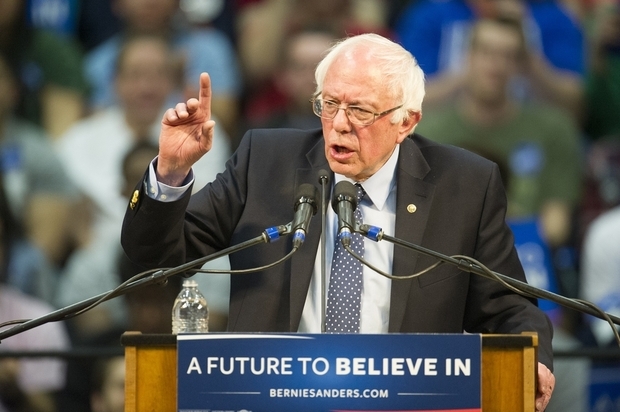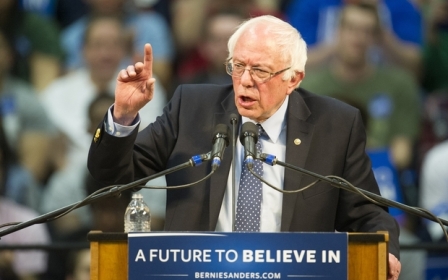ANALYSIS: Sea change is reshaping American views of Israel

NEW YORK, United States – On the face of it, the US-Israeli relationship appears as robust as ever.
Polls show that 70 percent of Americans view Israel favourably. At the recent meeting of the American Israel Public Affairs Committee (AIPAC), a pro-Israeli lobby group, presidential wannabes from both main parties vowed to back their Middle Eastern ally to the hilt.
But scratch beneath the surface and cracks in the monolithic support for the country have begun to show.
In recent months, Democratic lawmakers have called for an investigation into alleged Israeli abuses against Palestinians, while legal activists are increasingly using US courts against Israelis. Some pollsters even suggest that public opinion may be less pro-Israel than previously thought.
And, of course, Bernie Sanders, a Democratic senator from Vermont, has broken from the gaggle of presidential candidates by highlighting the suffering of Palestinians when talking about their conflict with Israelis.
“Public opinion is changing,” Seth Morrison, from the campaign group Jewish Voice for Peace, told Middle East Eye. “Younger Americans grew up in a very different environment to their parents and are willing to look at the Israel-Palestine conflict differently.”
Last month, Patrick Leahy, the other Democratic senator from Vermont, sent a letter to US Secretary of State John Kerry listing possible “gross violations of human rights” by Israel, including torture and extrajudicial executions.
The note, which was signed by 10 other lawmakers, also called for an investigation targeting Egypt on similar grounds. Egypt and Israel are among the top recipients of US military assistance.
Leahy’s signature is particularly relevant because his name is on a law that conditions US military aid on whether a nation's security forces engage in torture or other gross human-rights violations.
Israel's Prime Minister Benjamin Netanyahu insisted that Israeli forces do not commit abuses in battles with “bloodthirsty terrorists”.
US State Department spokeswoman Pooja Jhunjhunwala said staff were “reviewing the letter and preparing a response”. Such replies can include details on “bringing security force human rights violators to justice,” she told MEE.
Even if it achieves nothing, campaigners hailed a breakthrough.
“It’s significant because the lawmakers were willing to stand up against the backlash they knew they would get from AIPAC,” Morrison, a lobbyist, told MEE.
“We met members of Congress, asking them to sign, and in the past we wouldn’t have got in the door. Now they are open to better understand this issue.”
In another example, a group of Palestinians filed an ambitious $34.5bn lawsuit last month against US-based tycoons, charities and firms for supporting Israeli land grabs and other violations of Palestinians’ rights the past four decades.
They seek damages from Las Vegas casino magnate Sheldon Adelson, Irving Moskowitz, a philanthropist with property interests in East Jerusalem, and megachurch pastor John Hagee, for financing the construction of settlements on Palestinian soil.
The case was brought in Washington DC by activist Bassem al-Tamimi and some 35 other Palestinians and Palestinian Americans who allege conspiracy, war crimes, aggravated trespass, pillage and racketeering.
'Complete reversal going on in America'
Pro-Palestinian lawyers have a poor track record for winning in US civil courtrooms, but Martin McMahon, a lawyer for the complainants from the firm Martin McMahon and Associates, said American jurors are not what they once were.
“There is a complete reversal going on in America in terms of tolerating this behaviour from the Israeli government and our lawsuit is apparently a vehicle for those who are completely frustrated by that process,” McMahon told MEE.
Added to this is Sanders, who is playing catch-up against Hillary Clinton to secure the Democratic nomination for this year’s White House race, and seems more even-handed than other US politicians on the Israeli-Palestinian struggle.
At last month’s AIPAC meeting, Clinton declared “Israel’s security is non-negotiable”. Republican frontrunner Donald Trump lauded an “unbreakable bond” between the US and Israel. Sanders did not attend the love-fest.
In an interview with the New York Daily News, Sanders argued not only for "Israel’s right to exist,” but also against Palestinian misery, decrying a “poverty rate off the charts, unemployment off the charts, Gaza remaining a destroyed area”.
According to Maryland University scholar Shibley Telhami, this is not just idealism, but a bid to woo younger Democrats.
“He’s spoken about the issue in ways that no other major presidential candidate has ever done – not one with a serious chance,” Telhami told MEE. “He’s catering to the base and hoping that being closer to the base will help him against Hillary Clinton.”
According to Telhami, it is part of a broader trend.
While mainstream opinion polls show steadfast support for Israel, that may not be the full picture. A recent Gallup survey, for example, found that Americans sympathise more heavily with Israelis (70 percent) than Palestinians (17 percent).
Polls favouring 'even handed' diplomacy
Telhami, who conducts his own polling, said that when asked what role the US should play in mediating the Israeli-Palestinian conflict, most respondents – 66 percent – said Washington should be even handed.
According to Telhami’s data, Evangelical Republicans, a tenth of the US population, are the key pro-Israel constituency. Some 77 percent of Evangelical Republicans want the US to lean toward Israel in negotiations, compared to 29 percent of Americans overall.
“There used to be a national consensus where Democrats and Republicans were not hugely different on this issue,” Telhami told MEE.
“Over the past several years, a party divide has emerged in the American political mainstream. Democrats now overwhelmingly want the US to be neutral, and 80 percent of Democrats under 35 want the US to be neutral.”
Those in the pro-Israel lobby do not agree.
They say the personal acrimony between US President Barack Obama and Israeli Prime Minister Benjamin Netanyahu over settlement building and Iran’s nuclear project have not seriously undermined a time-tested relationship.
“The American people are overwhelmingly pro-Israel today,” Malcolm Hoenlein, executive vice chairman of the Conference of Presidents of Major American Jewish Organisations, an umbrella body, told MEE.
“I have no doubt that the relationship will continue to be strong, even with the glitches.”
The results of Leahy’s letter, al-Tamimi’s lawsuit and the Sanders campaign may show who is more correct.
New MEE newsletter: Jerusalem Dispatch
Sign up to get the latest insights and analysis on Israel-Palestine, alongside Turkey Unpacked and other MEE newsletters
Middle East Eye delivers independent and unrivalled coverage and analysis of the Middle East, North Africa and beyond. To learn more about republishing this content and the associated fees, please fill out this form. More about MEE can be found here.




